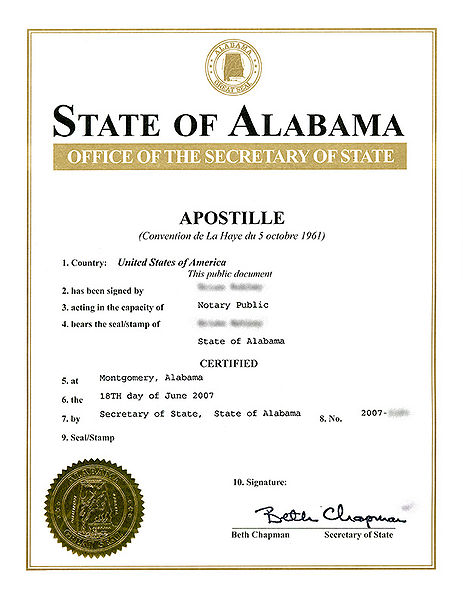Understanding the Apostille Process: A Comprehensive Overview to International Document Authentication
Browsing the intricate landscape of worldwide record authentication can be intimidating without a clear understanding of the apostille procedure. This guide thoroughly outlines the required steps, from recognizing which records require qualification to submitting them for confirmation by the Competent Authority. Realizing the relevance of an apostille and acknowledging possible challenges, such as insufficient submissions and language barriers, can considerably streamline the authentication journey. What exactly defines an apostille, and why is it so crucial for files destined for Hague Convention countries? These questions develop the structure of our expedition right into this essential legal treatment.
What Is an Apostille?
An apostille is a main qualification that validates the credibility of a file for use in another nation. This qualification, released by a marked authority in the nation where the paper came from, guarantees that the file is recognized as legitimate and legit in the worldwide field. The process of acquiring an apostille includes numerous actions, consisting of the verification of the paper's trademarks, seals, and stamps by ideal governmental bodies.
The apostille works as a globally recognized type of verification, made feasible by the Hague Convention of 1961. This treaty, formally called the Hague Convention Abolishing the Requirement of Legalisation for Foreign Public Records, standardizes the process of document accreditation among participant nations. The apostille itself is a standardized certification which contains particular info, such as the issuing authority, the country of origin, and the day of issuance.
It is important to keep in mind that not all files are eligible for an apostille. Usually, public files like copyright, marital relationship licenses, court orders, and instructional diplomas get this certification. Exclusive files, such as contracts and contracts, may require notarization and added steps to qualify.
Relevance of Apostille
Comprehending what an apostille is establishes the stage for valuing its value in international ventures. houston tx apostille. An apostille, essentially a type of qualification provided by a marked authority, validates the authenticity of a record for use in foreign nations that are signatures to the Hague Apostille Convention. This standardized process removes the demand for further legalization by consular offices or consular offices, thereby improving global transactions
The relevance of an apostille can not be overstated. It makes sure the reputation and acceptance of important papers-- such as birth certifications, marital relationship licenses, and educational diplomas-- throughout borders. For companies, it assists in the smooth conduct of global profession, mergings, and purchases by supplying a relied on approach of record confirmation. This reduces bureaucratic hurdles, saving both time and resources.
Moreover, an apostille enhances lawful safety and security and compliance. Governments and institutions can confidently count on the credibility of records birthing an apostille, alleviating the danger of fraud and misrepresentation. Hence, the apostille offers as an important device in promoting global participation and depend on. Its function in promoting effective and protected international purchases highlights its essential worth in today's about his interconnected globe.
Papers That Require Apostille
When participating in global transactions or lawful issues, specific papers frequently demand the verification offered by an apostille. This guarantees their recognition and approval in nations that are signatories to the Hague Apostille Convention. Frequently, individual papers such as copyright, marriage certificates, and fatality certifications call for an apostille, especially when they are used for procedures like immigration, marital relationship abroad, or global probate matters.
Educational files are another classification regularly calling for apostilles. Diplomas, transcripts, and academic records usually need this authentication for functions such as seeking more education, employment, or specialist licensing in a foreign country (houston tx apostille). This step ensures that the papers are acknowledged as genuine and valid
Legal files, including powers of attorney, sworn statements, and court orders, likewise commonly necessitate apostilles. Company files such as certificates of incorporation, bylaws, and business agreements might need an apostille to assist in worldwide trade, establish international branches, or involve in cross-border lawful procedures.
Steps to Obtain an Apostille

Obtaining an apostille entails a multi-step procedure that makes certain the credibility and approval of your records in international nations. The preliminary step is recognizing which files require an apostille. houston tx apostille. Typical files consist of birth certifications, marital relationship licenses, academic transcripts, and corporate records
As soon as determined, the file should be licensed by the suitable releasing authority. After accreditation, the document needs to be sent to the assigned Competent Authority in the record's country of beginning.
The submission procedure usually needs a completed application, the initial file, and a cost. Some jurisdictions may supply the choice of expedited handling for an additional fee. Upon successful confirmation, the Competent Authority will attach the apostille certification to the file, therefore confirming its credibility.
Typical Challenges and Solutions
Navigating the apostille procedure can present several usual obstacles that, if not effectively dealt with, might postpone or complicate paper authentication. Each country has details needs for the kinds of documents that can be apostilled, and any type of variance from these can result in being rejected.
An additional typical obstacle is recognizing the different handling times. Processing times can differ substantially in between countries and even between various regions within the same country. It is vital to informative post represent these variations when planning the apostille process to avoid unexpected hold-ups.
In addition, language obstacles can present considerable challenges. see it here Papers in a foreign language frequently require qualified translations, and any kind of mistakes in translation can cause additional problems. Engaging a specialist translation solution can reduce this risk.

Conclusion
Understanding the apostille process significantly boosts the efficiency of global document verification. By comprehending the requirement of identifying and accrediting called for files, and browsing the submission to the Competent Authority, the procedure becomes much more convenient.